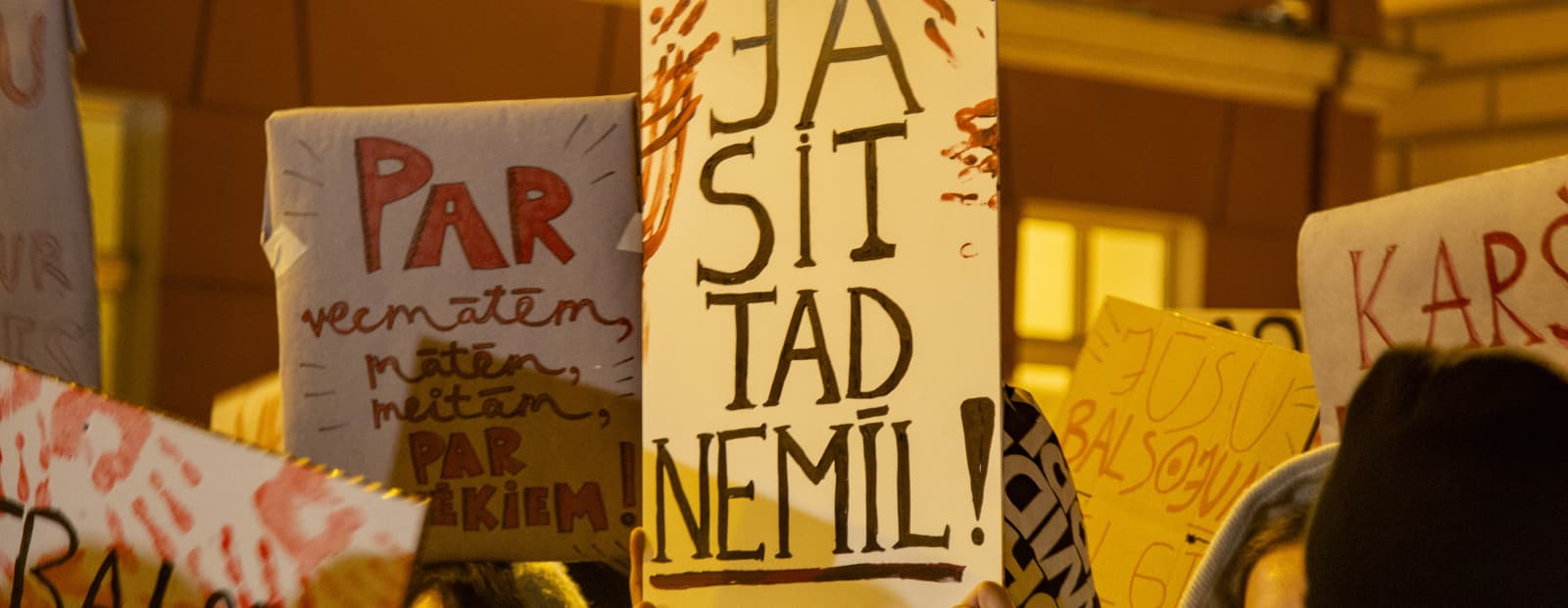As observed by the LETA agency, the picket began at 6 p.m., but shortly after 7 p.m. its participants began to disperse. LETA's observations indicate that the picket took place without incident.
Those gathered with posters called for"stop covering up the perpetrators" and not to withdraw from the Istanbul Convention.
Those gathered held Latvian and European Union flags. LGBT+ community flags also flew near the Saeima.
The picket participants, who were mostly younger, pointed out that"the opinion of the populists is not the truth of the people." The picket participants also brought their children and pets with them.
Protesters beat drums, chanted slogans and whistled, calling on politicians to reconsider. Protesters also asked whether this move was in support of Russia.
The protesters shouted, for example,"Lobbying Russia, we are not defending Latvia","Yes to the Convention, no to obscurantism","The bill is evil, what a shame","Today's decisions, tomorrow's bruises". The crowd also used phone flashlights and other lighting tools.
In between chanting slogans, the protesters also used wind instruments and other noise-making devices, as well as sang.
A large number of law enforcement officers were monitoring the situation. There was also a larger than usual number of law enforcement officers in Old Riga.
The picket participants pointed out that many European Union countries have called on Latvian parliamentarians to reconsider and not withdraw from the Istanbul Convention.
The Saeima has supported the bill providing for Latvia's withdrawal from the convention in its first reading with 52 votes. The Saeima is expected to vote on the second, final reading tomorrow.
According to the"Marta" center, such a vote has caused outrage in part of society because it"threatens the progress made so far in the field of human rights and gender equality."
The "Marta" center emphasizes that the Saeima also supported the declaration "on non-tolerance of violence", which, in the organization's opinion, is presented as an alternative to the convention.
"Such a declaration does not replace an internationally recognized mechanism that ensures real monitoring, accountability, and international support in preventing violence. It only creates an apparent solution, while in reality it weakens protection against violence and reduces Latvia's credibility at the international level," emphasizes the "Marta" center.
The organization believes that withdrawing from the Istanbul Convention would mean a retreat from the principles of democracy and human rights. The Marta Center points out that this sends a dangerous signal that the state is ready to turn a blind eye to violence and inequality.
"This initiative is also being used as a political tool to target transgender people and other vulnerable groups in society, creating the false impression that their rights are a threat to society. In fact, it is the inclusion and protection of these groups that strengthens democracy and common security," notes the "Marta" center.
The"Marta" Center calls on the Saeima to reject the bill on withdrawal from the Istanbul Convention in the second reading and to affirm that Latvia remains committed to democracy, gender equality, and human rights.
The"Marta" Center is a public organization that has been advocating for gender equality, the protection of women and children against violence since 2001, as well as providing legal, psychological and social assistance to victims of violence. Every year, the center helps more than 800 women and young people, while actively participating in policy-making, educational campaigns and promoting public awareness of human rights and security.
As reported, on October 23, the Saeima conceptually supported a bill on Latvia's withdrawal from the Council of Europe Convention on preventing and combating violence against women and domestic violence, or the so-called Istanbul Convention, with the votes of the opposition and the Greens and Farmers' Union.
The bill was submitted by the opposition party"Latvia First" (LPV), but is also supported by other opposition parties - the National Alliance, the United List and"For Stability", as well as ZZS politicians in the ruling coalition. The coalition parties"New Unity" and "Progressives" do not support the withdrawal from the convention.
In the first reading, 52 deputies voted for withdrawal from the convention, no deputies voted against, deputy Didzis Šmits abstained from the vote, but deputies from the"New Unity" and "Progressives" chose not to participate in the vote at all.
Before the vote on the first reading, the majority of deputies decided to determine urgency for it, which means that it will be considered in only two readings. If the law has been adopted in the Saeima in two readings and urgency has been determined by at least two-thirds of the votes of the deputies, the President of the Republic cannot use the veto right to stop the promulgation of the law.
A total of 52 deputies from the opposition party and the coalition ZZS voted in favor of the urgency, 31 deputies from the"Progressive" and "New Unity" factions were against, while ZZS deputy Andris Bērziņš abstained from the vote. Thus, less than two-thirds of those present voted in favor of the urgency.
The draft law on withdrawal from the Istanbul Convention was submitted by the LPV. Initially, it did not even have an annotation or justification, which the LPV nevertheless provided within a couple of weeks. The LPV believes that the current practice of implementing the Istanbul Convention prevents us from gaining certainty whether, in each case, state and local government institutions are implementing measures against violence and its risks in accordance with the principles contained in the declaration.
In Latvia, the Council of Europe Convention on preventing and combating violence against women and domestic violence, or the so-called Istanbul Convention, entered into force on 1 May last year. It is an international treaty that requires its member states to develop a coordinated policy to better protect women from all forms of violence, as well as women and men from domestic violence. Among other things, member states must provide victims with comprehensive assistance and protection, crisis centres, a 24-hour crisis hotline, specialised support centres for victims of sexual violence, and protect and support children who are witnesses of violence.

